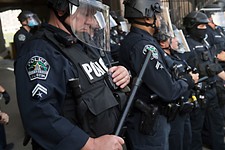APD Never Told Mother About Killing Her Son
Acevedo says he feels for the family
By Jordan Smith, 9:15AM, Thu. Jun. 6, 2013

Felicia Wallace woke up on the morning of May 31, 2011, went to the bathroom, got something to drink, smoked a cigarette, and turned on the television. That's when she saw it: A photo of her then-20-year-old son, Byron Carter, on the news. He'd been shot.
"I really didn't know what to do," she testified Wednesday afternoon in the civil rights case she and Carter's father have brought against Austin Police Department Officer Nathan Wagner alleging excessive use of force. Wagner fired five rounds into a vehicle Carter was a passenger in near Downtown the night before, May 30, 2011. Four of those shots hit Carter and he died from his injuries.
"I was really hysterical," she recalled. "I kind of like fainted out for a good 10-15 minutes before I came back." When she did, her mother was at the door; she'd heard the news too. "We both grabbed each other and hugged each other," she said, and the pair waited on their front porch for someone from APD to come by and confirm what they'd seen on TV and to tell them what happened.
No one ever came. According to Wallace, no one has ever explained to her family what happened that night, nor has anyone offered condolences for her loss. Carter's father, Byron Carter, Sr., testified earlier that he found out his son was dead when his older son called the house at 5am that morning; a fact confirmed when a detective called late that afternoon to say Carter was deceased. But that's all he had to offer, Carter said.
During testimony late Wednesday afternoon, APD Chief Art Acevedo expressed his sympathy for the family and said his heart went out to them. "I wish I'd had the opportunity" after the shooting to offer condolences, he said. To "show [some] humanity," which was how Acevedo says he was raised and how he tries to handle every family that has lost a loved one in an incident involving his officers.
But Acevedo said Wagner was not out-of-control the night Carter died and that the grouping of five rounds that pierced the car being driven by Carter's friend, then-16-year-old Leyumba Webb, was "the most controlled shooting involving a vehicle that I've ever seen."
According to Wagner's testimony, he fired on the car as Webb accelerated it toward him and his partner, and friend, Officer Jeff Rodriguez. Wagner shot because he believed that he was in danger and that his partner had been hit by the car and was in danger of being dragged down the street. The use of force was "objectively reasonable" given the perceived threat, Wagner and his attorney, Robert Icenhauer-Ramirez, argue.
But Carter's family disagrees. Webb said that he and Carter were in the car and just pulling away from a parallel parking spot at the curb line at East Eighth Street, just East of I-35, when he heard Carter, startled, tell him to "Go." It sounded as though the pair was in danger, Webb said, so he reacted. He did not see any police; he did not strike Rodriguez, he says.
Both Wagner and Rodriguez admitted that they had been following Carter and Wagner without their knowledge and had used the cover of darkness on the street to avoid being seen – specifically, to avoid the phenomenon of "silhouetting," backlighting by a street lamp that would make them a target should someone up the street intend them harm. That tactic, Acevedo said, is a valid one designed to keep officers safe.
But Adam Loewy, Carter's family's attorney, argues that the officers made a dangerous decision and scared Webb and Carter into reacting. Webb said as he pulled forward shots rang out and he acted instinctually to get away as quickly as possible. The firing of the shots, Loewy argues, was a display of excessive force that cost Carter his life. He's asking a federal jury to award Carter's family, including his toddler son, "no less" than $1.5 million.
During his cross examination of Acevedo, Loewy noted that a policy change after Carter's death – in July 2012 – advises officers not to put themselves in the way of a moving vehicle because that might provoke their use of deadly force.
Was the policy change made in response to Carter's death? Loewy asked.
No, Acevedo said; the policy change was a routine matter, and part of a number of policy changes made that summer in order to ensure the department is up-to-date with best practices.
Indeed, Icenhauer-Ramirez pointed out that the policy addresses officers putting themselves in the way of vehicles that are already moving. Wagner and Rodriguez contend that Webb's car was stationary until after the officers were in plain view. Webb disputes that assertion.
Ultimately, however, Acevedo said that Wagner did not act in a "rogue" manner the night Carter died. "Absolutely not," he said.
Before Acevedo took the stand Wednesday afternoon, District Judge Lee Yeakel denied Icenhauer-Ramirez the ability to question the chief about whether he believes – based on his training and 26-year experiences in law enforcement – whether Wagner's use of force was excessive. To allow Acevedo to testify in that regard would prejudice the jury, he ruled. Acevedo "cuts a fine figure and he is an excellent chief of police," Yeakel said. As such, the jury would be "unduly swayed by his opinions in this case." The ultimate question of whether excessive force was used will be left to the jury to decide, he said.
Testimony in the case will continue Monday morning.
Got something to say on the subject? Send a letter to the editor.
A note to readers: Bold and uncensored, The Austin Chronicle has been Austin’s independent news source for over 40 years, expressing the community’s political and environmental concerns and supporting its active cultural scene. Now more than ever, we need your support to continue supplying Austin with independent, free press. If real news is important to you, please consider making a donation of $5, $10 or whatever you can afford, to help keep our journalism on stands.
Austin Sanders, Feb. 16, 2023
Austin Sanders, Feb. 3, 2023
Jordan Smith, Oct. 22, 2013
Jordan Smith, Oct. 18, 2013
May 22, 2014
Austin Police Department, Cops, Courts, Criminal Justice, APD, Art Acevedo, Byron Carter, Leyumba Webb, civil rights, police shooting, policing, Nathan Wagner, Jeff Rodriguez, excessive force, Robert Icenhauer-Ramirez, Adam Loewy, policing, police policy, police tactics












